She Dreams 'Purple'
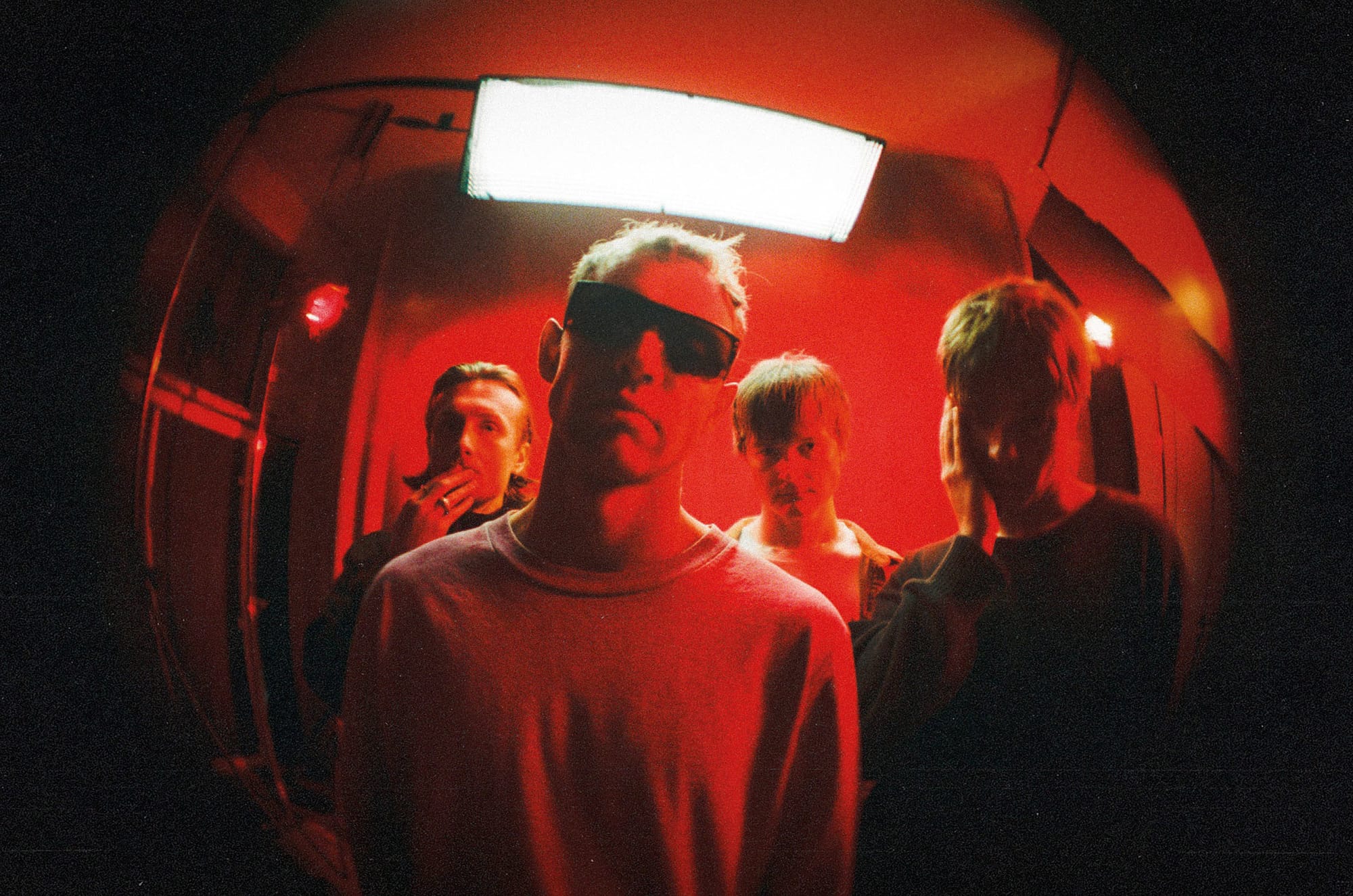
In just a few years, Wunderhorse have transformed from the hushed, solitary reflections of Jacob Slater’s lockdown recordings into the roar of the UK’s most essential new guitar band. By blending 'heart-on-sleeve' vulnerability with a blistering sonic grit, they’ve tapped into something deeply primal. With two acclaimed albums already cementing their legacy, the band isn't just rising through the festival ranks; they’re redefining what it means to be an authentic British rock band in 2025.
The foundation of this ascent was laid with their debut, 'Cub', a record that introduced Slater’s knack for pairing melodic nostalgia with a jagged, grunge-infused edge. It was an introduction that felt both intimate and expansive, but it was merely the prologue. With their follow-up, 'Midas', the band threw away the polished rulebook of modern production. Recorded with a warts-and-all philosophy, the album captured the unbridled, sweaty energy of a band playing in a room together, unfiltered, uncompressed, and undeniably real.
This commitment to raw performance has turned their live shows into something of a pilgrimage for fans of "real" music. On stage, songs like 'Purple' and 'Silver' are no longer just tracks on a playlist; they are visceral experiences, fueled by Slater’s magnetic, often unpredictable presence. As the industry continues to lean into the digital and the manicured, Wunderhorse stand as a defiant reminder of the power of four people, a few amps, and a story worth telling. They aren't just playing the game; they are reclaiming the soul of British rock and roll.
Ghosts of Dead Pretties
However, this mastery didn't appear in a vacuum. Before the melodic swells of Wunderhorse, there was the jagged, short-lived explosion of Dead Pretties. As the frontman of the London punk trio, Slater gained a reputation for a brand of chaos that burned bright and fast. With only a handful of songs, 'Social Experiment', 'Nothing', 'Confidence', 'Water', and 'Take it Easy' to their name, the band became cult legends of the Brixton Windmill scene, standing alongside peers like Shame and Goat Girl.
At the time, the NME described their sets as "deranged", with Slater at the centre as a "wild-eyed, unpredictable presence." His performances were a spectacle of contorted expressions and ramshackle energy, picture a fist-fight ending in bloody noses and broken guitars. It was a lifestyle of screaming “fuck off!” to conformity, but it was unsustainable. The very things that made the band a must-see, the volatility and the "all-or-nothing" aggression, were the same things tearing them apart from the inside.
By the time the end came, the romanticism of the "starving artist" had worn thin. Slater was battle-worn, grappling with the fallout of a lifestyle that demanded constant high-octane destruction. When Dead Pretties finally called it a day in 2017, it wasn't just a band breaking up; it was a total collapse of a persona. Slater didn't just need a new musical direction, he needed to disappear entirely to find out who he was
Coastal Rebirth
Seeking clarity, Slater retreated from the London frenzy to the surf-washed shores of Newquay, Cornwall. This wasn't a temporary retreat, but a total immersion. Between days spent on the Atlantic waves and working odd jobs as a labourer, a new sound began to germinate in the quiet moments of physical exhaustion. The fury and angst of his punk roots gave way to a more melodic, widescreen reflection; he traded the sneer of the Sex Pistols for the soulful, expansive storytelling of Neil Young, Joni Mitchell, and Bob Dylan. In the isolation of the coast, Slater found a different kind of intensity, one that didn't require screaming to be heard.
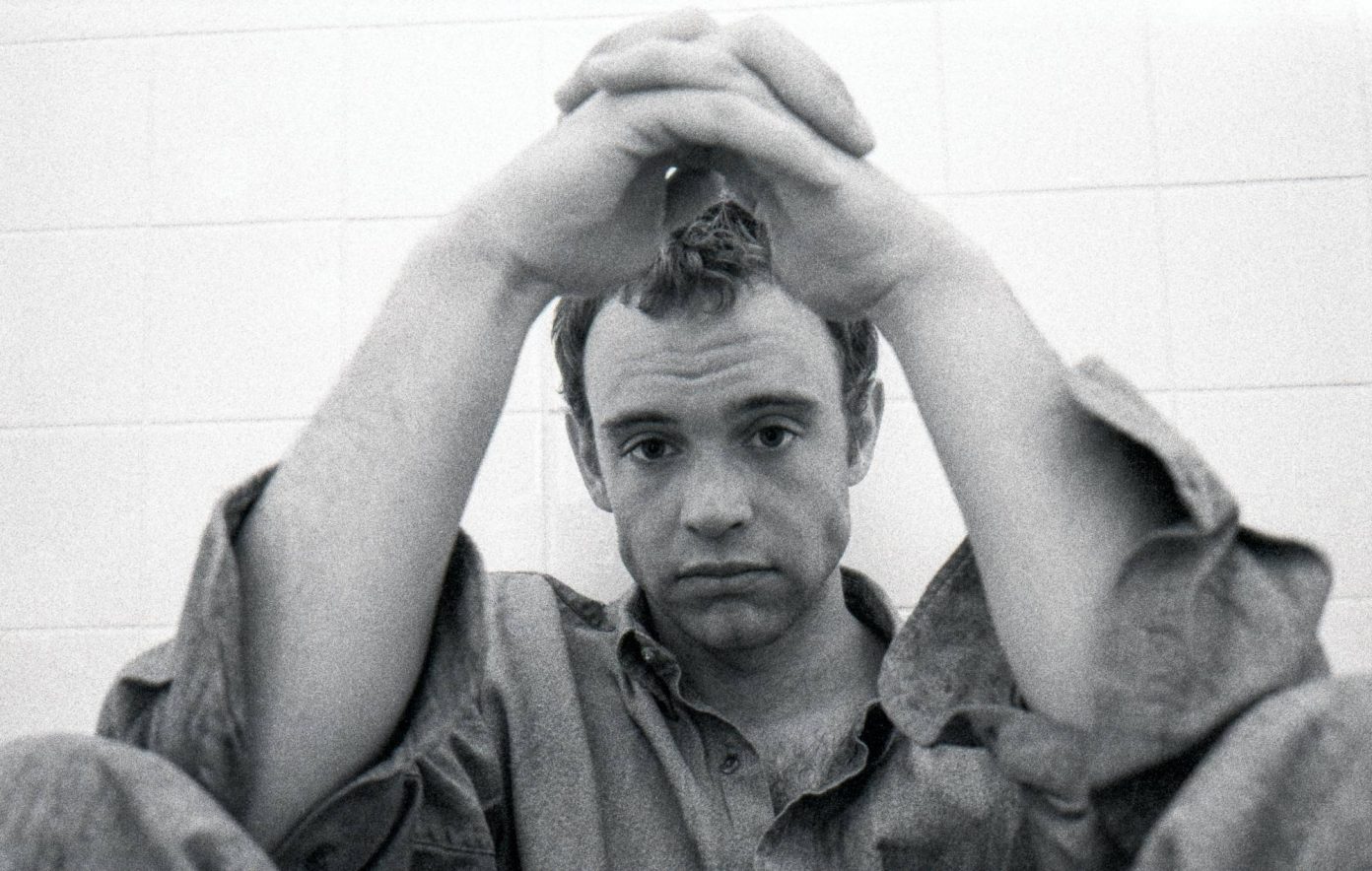
This period of quiet reinvention was further fueled by a surprise detour into acting. Slater was cast as Paul Cook, the legendary drummer of the Sex Pistols, in Danny Boyle’s biopic 'Pistol'. It was a surreal full-circle moment: to move forward, he had to literally inhabit the skin of the movement he was leaving behind. Ironically, playing a punk icon seemed to provide the final spark of inspiration Slater needed to step back into his own light. By revisiting the roots of his teenage rebellion through a lens of professional discipline, he found a new perspective on his own artistry.
Reinvigorated and armed with a notebook full of coastal reflections—songs that hummed with the salt air and a newfound sense of space, he headed into the studio. He wasn't just recording an album; he was documenting a survival story. These sessions would become the first chapter of the Wunderhorse story, beginning with the release of the hauntingly beautiful single 'Teal'.
Cub: The Birth of a New Voice
Armed with a collection of songs that hummed with salt air and newfound space, Slater headed into the studio. Among them were 'Leader of the Pack' and '17', tracks that had lingered with him since the Dead Pretties era. Once discarded, they now became the cornerstones of a new musical direction under the moniker Wunderhorse. When asked about the name, Slater told Hero Magazine: "There's this old TV show from the 50s or 60s called Champion the Wonder Horse... I started using the name as a joke, and it was one of those things that stuck.
Despite being the oldest track on the record, '17', named after Slater’s age at its inception, stands as a haunting centrepiece. Its lo-fi tenderness grapples with a biting sense of imposter syndrome: “Do I look pretty in your pictures? / Did I fool you with a laugh? / Don’t be the clown who lets his armour down / Just take the photograph.” It revealed a vulnerability that his previous punk persona would never have allowed.
Conversely, 'Leader of the Pack' felt like a ready-made arena anthem. Leaning into Americana blues and the heavy-footed groove of Led Zeppelin, it showcased a more advanced musicality. Slater achieved the rarest feat in songwriting: crafting a massive, communal chorus without sacrificing his edge. It was the first sign that Wunderhorse was destined for stages much larger than the Brixton Windmill.
For Slater, 'Cub' was a "complete tale of growth," serving as a retrospective on the road that led him to Newquay. He told the NME, “I found it more interesting to write about other people than myself... I thought it’d be better to look at people around me who’d impacted my life rather than running the risk of sounding up my own arse.”
The record is a masterclass in texture and influence, with each track serving as a window into Slater’s diverse musical DNA. In 'Mantis', the band crafts a heartbreak lullaby that balances on a knife-edge between Radiohead-style eeriness and a sudden, surf-rock euphoria. It is a song of contrasts, moving from a skeletal, haunting intimacy into a sprawling wall of sound that feels both unsettling and deeply liberating.
That sonic exploration continues with 'Poppy', a track that drags dirty, vintage psych-rock kicking and screaming into the modern day. It leans into a gritty, fuzz-drenched aesthetic that feels heavy yet agile, proving that Slater hadn't lost his edge, even as he moved toward more melodic territory.
This sense of atmosphere is pushed even further in 'Morphine', which envelops the listener in a brooding haze reminiscent of The Brian Jonestown Massacre. It is a slow-burning exercise in "head-rushing freak-beats" and grunge-infused psychedelia, establishing a mood that is as intoxicating as the title suggests.
However, it is 'Purple' that truly anchors the record, widely considered one of the best songs of the last decade. The track is a definitive showcase of Slater's dynamic vocal range; he carries the listener through the verses with a mellow, melancholic delivery before erupting into a stadium-sized, Springsteen-esque roar during the choruses. It is an anthem built for the ages, blending technical guitar brilliance with a raw, emotional honesty that has become the band's calling card.
Matching that emotional intensity is 'Teal', an explosion of storytelling that serves as a visceral high point on the album. The track is fueled by a sense of urgency, with Slater’s lyrics acting as a direct line to his internal world. Lines like “You gotta gift man, go and be something / If I was in your shoes, I would be jumping” have already become iconic within the fanbase, capturing a sense of wasted potential and the desperate hope of a second chance.
The album eventually reaches its peak and closes with 'Epilogue', a snarling masterpiece that serves as a bridge back to Slater's punk origins. The song builds into a powerful vocal and guitar crescendo that often takes the first-time listener by surprise with its sheer ferocity. It is a calculated, emotional explosion, a reminder that while Slater was successfully finding himself and embracing new, sophisticated sounds, he hadn't forgotten the fire and the fury that he came from.
While the "troubadour" label stuck to the record's quieter moments, the sonic palette of 'Cub' is far more expansive than a simple singer-songwriter project. Within its layers, you can hear a vast archive of guitar history: the melodic sweep of Britpop, the shoegaze textures of Slowdive and Ride, and the "quiet-loud" dynamics perfected by the Pixies. There is a heavy debt to the early, psychedelic-drenched era of The Verve, and, in the record's most aggressive outbursts, the jagged, uncompromising DNA of Nirvana. It is this melting pot of influences, paired with Slater's newfound lyrical maturity, that prevents the album from ever feeling like a mere nostalgia trip, instead grounding it as a modern classic in its own right.
The industry took notice immediately. DIY Magazine remarked that 'Cub' sounded more like the work of a "wizened troubadour" than a debut, noting its kinship with the "post-Britpop comedown in the late ‘90s." Soon, Wunderhorse were the "musician’s musicians," being hand-picked for high-profile support slots by the likes of Sam Fender, Foals, and Fontaines D.C. These weren't just standard opening sets; they were a baptism by fire in arenas and major festival stages, proving that Slater’s songs had the legs to carry across vast, open spaces without losing their intimate bite.
Slater met the challenge with a smirk. “You do feel humbled,” he admitted, “but also there’s a part of you that thinks, ‘OK, we fucking deserve to be here.’” This new confidence was fueled by a radical change in lifestyle. Moving to Cornwall meant hitting the "antics" of his youth on the head; the drugs and drink were replaced by the "stone-cold sober" adrenaline of the stage. He found that performing without a chemical safety net allowed for a deeper, more visceral connection with the music, one that was "totally real" and allowed the songs to breathe with a terrifying, natural intensity.
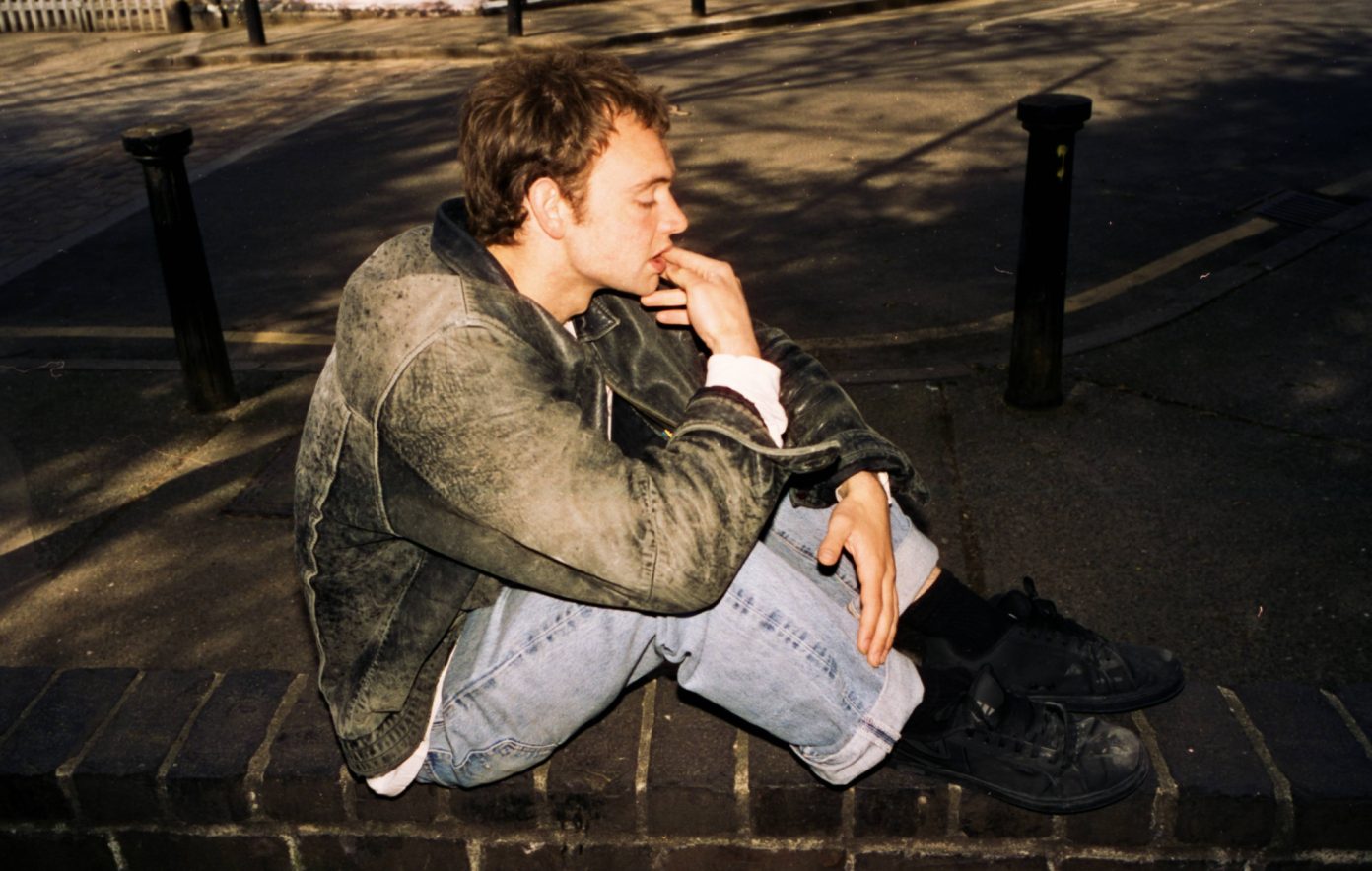
What began as a solo endeavour soon solidified into a powerhouse quartet. Slater was joined by Harry Fowler (guitar), Pete Woodin (bass), and Jamie Staples (drums). This wasn't a group of session players, but a brotherhood that brought a new, muscular dimension to the material. As they toured the UK and Ireland, including a triumphant return to Cornwall and a landmark sell-out show at London's Electric Ballroom, the band's chemistry began to boil over.
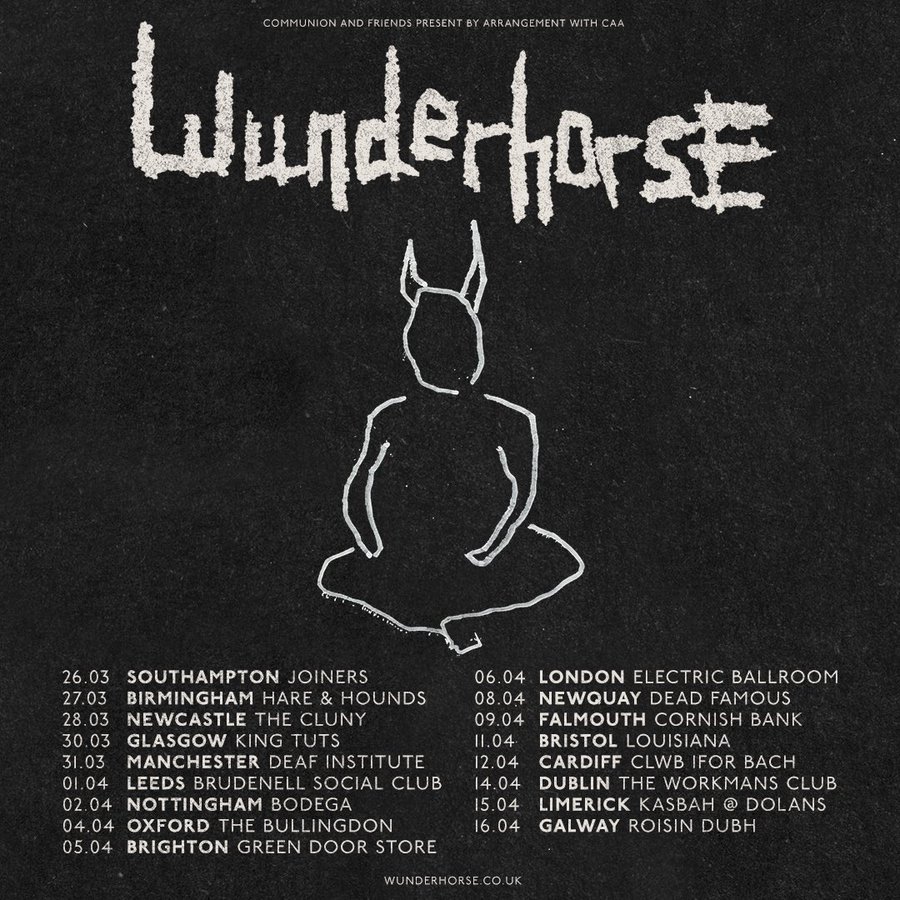
On the road, the delicate edges of 'Cub' began to sharpen. The band started road-testing new material that felt heavier, darker, and more spontaneous than anything they had recorded previously. These new tracks hinted at an even rawer chapter to come, one where the "solo songwriter" would fully give way to the "collective roar." This evolution was the first glimpse of the "warts-and-all" philosophy that would soon define their sophomore effort, signalling that the polish of the debut was merely a stepping stone toward something far more primal.
Midas: The Rebirth of a Band
Wunderhorse began their second chapter in April 2024 with the release of 'Midas'. The title track was a blues-driven guitar anthem that saw Slater fully embracing the "thin, wild mercury sound" of Bob Dylan, utilising a hybrid of speaking and singing to deliver ambiguous, biting lyrics. Written in a bathtub in Paris and resurrected in a studio in Minnesota, the song introduced the character of Midas, the man who makes you feel like a "pencil stub, all used up," yet treats the destruction as "just business." It was a sharp departure from the melodic warmth of 'Cub', signalling a darker, more cynical edge.
The follow-up single, 'July', arrived in May 2024 as comfortably the heaviest thing the band had ever recorded. It was a sonic assault designed to make the listener feel "locked inside the bass drum," with a raw intensity that pushed the amplifiers to their breaking point. While the "wall of noise" approach blindsided some, briefly obscuring Slater’s intricate songwriting in favour of sheer visceral energy, it was a deliberate statement of intent. This was a record designed for the sweat and chaos of the live environment, far removed from the polished expectations of a typical sophomore release.
Bridging the gap between this aggression and the band's deeper introspective roots is 'Silver', perhaps the most "complete" track on the record. Originally written long before the 'Midas' sessions began, it almost didn't cut until the band stripped it back to its raw essentials at Pachyderm Studio. Slater describes the song as an exploration of the "ugly side of yourself that you try to keep a secret", the parts of your makeup that "make your skin crawl" but ultimately drive you forward. Musically, it starts as a deceptive indie-guitar anthem before erupting into a roaring, Nirvana-flecked climax. When Slater reaches the peak, screaming “You’re mine, bluebird!” in a scratching, desperate tone, it captures the agony of clinging to something rare and vulnerable that you know you must eventually let go.
This honesty flows directly into 'Emily', which serves as one of the record's load-bearing columns. It is a track coiled with tension, utilising Jamie Staples’ incisive drumming to drive a narrative about the suffocating weight of industry life and corporate expectations. With lyrics like “This apple's crawling with worms” and “This job is killing me slowly,” Slater channels a Kurt Cobain-esque drawl to describe a soul being degraded by the "machinery" of the modern world. It is the perfect sonic companion to 'Superman', which provides a poignant breather amidst the overdrive. A gentle, acoustic-led story, 'Superman' tells the devastating tale of an "everyman" who puts his passions aside for a mundane life, all while secretly believing he has a "superhero" inside him that the world will never see. It is perhaps the most vulnerable Slater has ever sounded, capturing the quiet tragedy of dreams that fall by the wayside.
The album's scope expands further with the near nine-minute epic 'Aeroplane', a stark departure from the high-octane tracks that precede it. Driven by a plodding acoustic melody and a recurring piano rhythm, the song serves as a moment of total reflection. It’s a grandiose, fragmented piece where Harry Fowler’s ear-splitting guitar solo brings a sense of intentional discomfort, mirroring the "inner turmoil" of the lyrics. It’s a song about the capacity to love and the struggle to be lifted out of a self-made pit, ending the album not with a tidy resolution, but with a sprawling, honest question mark.
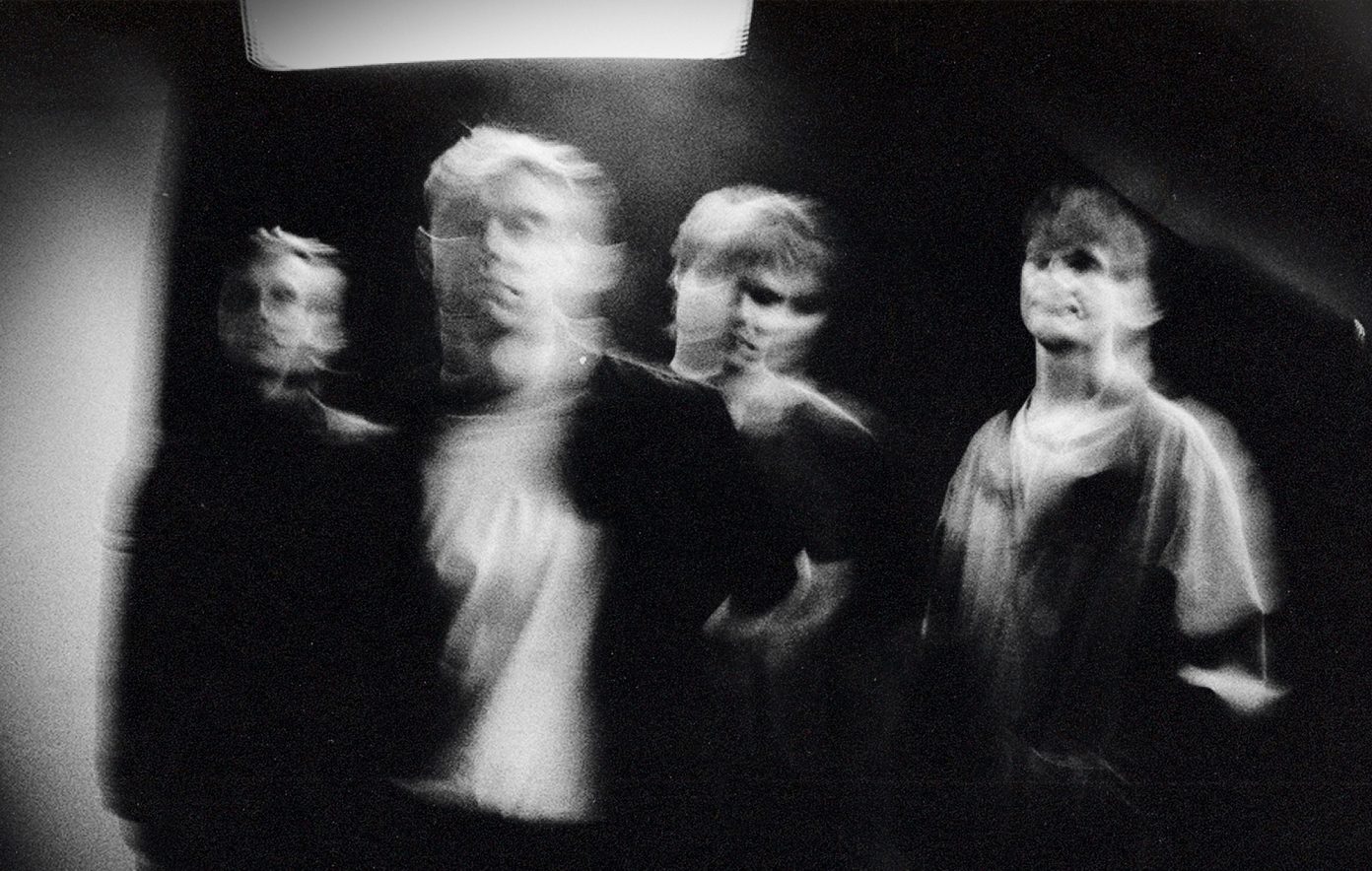
Nestled toward the end of the record are 'Cathedrals' and 'Girl', two tracks that further showcase the band’s range. 'Cathedrals' is a stadium-sized testament to romantic obsession, casting beauty and destruction as two sides of the same coin with the haunting line: “The cathedrals are on fire / I will set them all on fire / Just for you.” It has quickly become an arena-ready anthem, featuring some of Slater’s most raspy and commanding vocals to date. In contrast, 'Girl' leans into a lighter, almost 90s-nostalgic alternative sound, a "beggar at the banquet" love song that finds Slater admitting to an intoxicating, sappy devotion. Together, these tracks ensure that 'Midas' isn't just a "loud" record, but a nuanced portfolio of characters who are, as Slater wryly puts it, "all broken" in their own way.
While the 'Midas' cycle is defined by its "face-pressed-against-the-amp" aggression, 'Arizona' remains the undeniable centrepiece of the record, a "nocturnal microclimate" that holds the album’s emotional gravity. It is the moment where the distorted noise falls away to reveal a staggering, human vulnerability. Positioned strategically amidst the high-octane chaos, 'Arizona' functions as the record’s quiet, aching heart, acting as a masterclass in restraint. While the rest of the album is a collective roar from a four-piece band, this track feels like a solitary candle burning in a vast, empty room; a space where the clock seems to stop, and the only thing left is the raw vibration of Slater’s vocal cords and the skeletal pluck of a guitar.
On the surface, it is a soft, folk-leaning ballad, but its lyrical weight is devastating. Exploring the "presence of absence," the song touches on a grief without a name, widely interpreted by fans (and hinted at by Slater in live introductions as a "true story") as a reflection on miscarriage or the loss of a child before birth. Right from the beginning, Slater places us in the presence of a ghost without a name—a quietly devastating grief that society often leaves unspoken. When Slater sings, “I never meant to hurt you / Or to tear you from this life,” there is a crushing sense of guilt and sincerity that feels like a long-held silence finally being broken. The repeated question that threads through the song, “Where do you go to, my love?” is heartbreakingly simple but endlessly loaded; it’s a looping ache, circling again and again in search of peace.
The brilliance of the song also lies in its use of geography to mirror internal trauma. By setting the narrative in the desert—a place defined by heat and emptiness, Slater creates a physical space for this sorrow. The rare rain in the Arizona desert feels symbolic of memory returning unexpectedly, bringing sudden life to something you thought was gone, while the wind carrying sorrow to Boston suggests that grief follows you across continents. Small, delicate details like “Your mama she’s a beauty /, And your daddy’s eyes are blue” are incredibly tender, but the emotional gravity has intensified through live performances. Slater has begun adding a whispered tag to that line: "just like mine." This small, four-word addition transforms the song from a poetic observation into a direct, personal confession.
Ultimately, 'Arizona' gives 'Teal' and 'Purple' serious competition for the title of the best thing Slater has ever written. It tackles a subject rarely addressed in the landscape of modern rock with such grace, avoiding melodrama in favor of a sincerity that is almost too heavy to bear. It proves that while the band can blow the roof off an arena with a wall of noise, their greatest strength lies in their ability to make 10,000 people hold their breath in total, pin-drop silence. It is a masterclass in songwriting, proving that even amidst the volume of 'Midas', Slater’s ability to pin down the human condition remains unmatched.
The success of 'Midas' transformed Wunderhorse from a cult favourite into a genuine phenomenon. For a band that had cut its teeth in the low-ceilinged, sweat-soaked rooms of the Brixton Windmill just down the road, walking onto the hallowed boards of the O2 Academy Brixton felt like a homecoming for the soul of British rock. The room was sold out, and the atmosphere was described by many as "biblical." There were no flashing LED screens or synchronised light shows; the stage was sparse, dominated by stacks of amplifiers and the raw, looming presence of the four-piece unit.
As the lights dimmed, the roar from the crowd wasn't just loud, it was desperate. In a review for Louder Than War, the impact of the moment was clear: "When Jacob Slater and the other three members of Wunderhorse walk out onto the hallowed boards... they spare a moment to pause and take it all in. You can’t really blame them. They’re faced with a sell-out crowd at their biggest headline show to date, and the audience is going nuts." The performance was a masterclass in tension, as they challenged the room with the abrasive energy of the new material. By the time the "Springsteen-esque" roar of 'Purple' filled the hall, the Academy had transformed into a cathedral of noise. The wider music press walked away with a singular narrative: the "session player" era was over, and Britain had finally found its next great, dangerous guitar band.
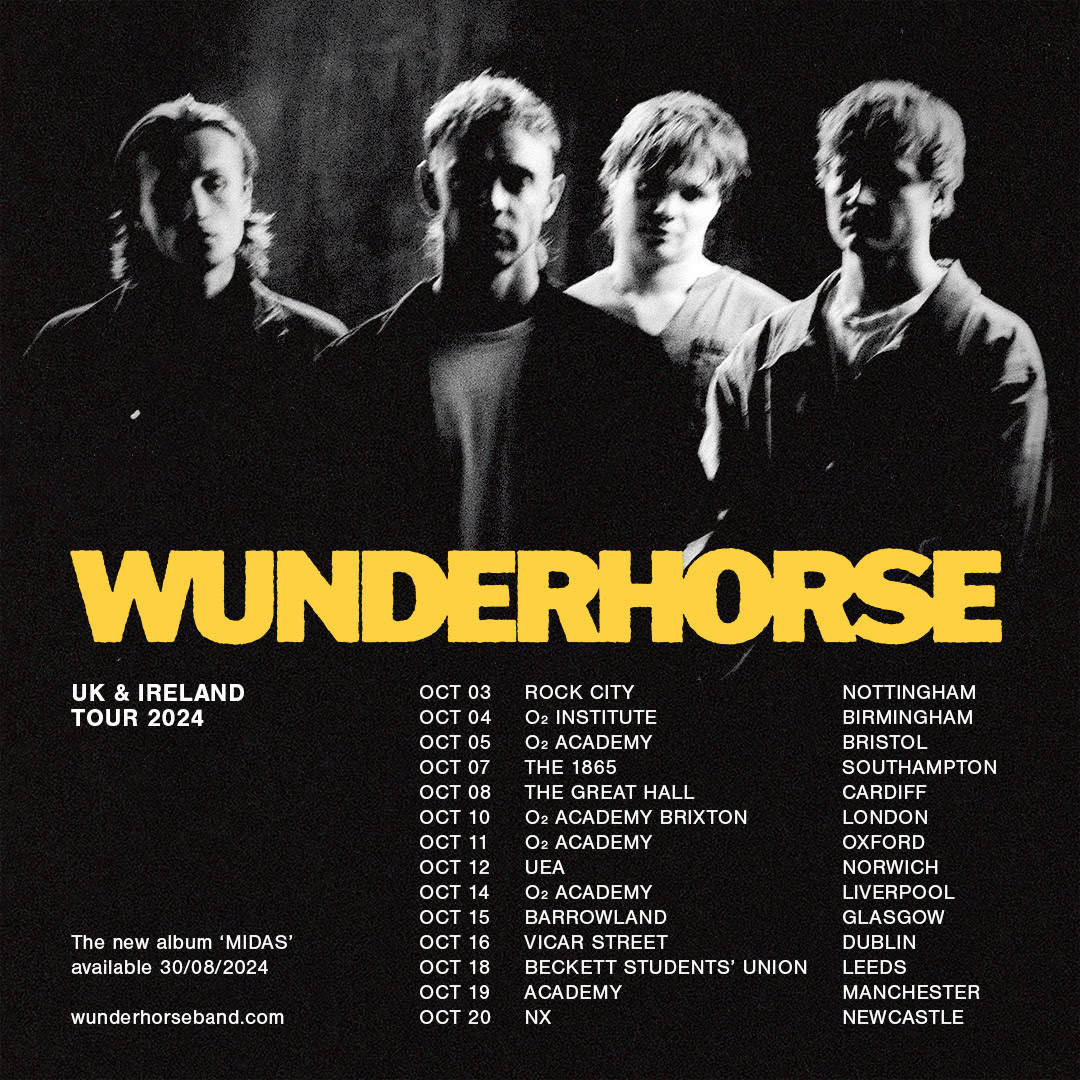
The Brixton show was the crown jewel of a tour that felt less like a promotional circuit and more like a victory lap through the heart of British guitar music. Across the country, the 'Midas' tour captured a band at their most unfiltered, leaning into the "quiet-loud" dynamics that had become their signature. At every stop, the setlist was a calculated risk, favouring the jagged, unpolished energy of the new record over the safer, melodic hits of 'Cub'. This was a deliberate choice to force the audience into the present moment, mirroring the live-to-tape ethos of their time at Pachyderm Studio.
In the darkened rooms of the UK’s great Academies, the chemistry between Jacob Slater, Harry Fowler, Jamie Staples, and Pete Woodin reached a fever pitch. There was an almost telepathic intensity to their playing; they weren't just performing songs, they were reacting to the air in the room. This tour solidified the "dysfunctional family" dynamic that Slater had craved, moving away from the "frontman and session guys" hierarchy toward a unified, formidable front. By the time they hit the final notes of that Brixton set, the "blue touch paper" had been lit, and the cult of Wunderhorse had officially outgrown the underground.

This groundswell of momentum carried the band into 2025, where they made the inevitable leap to Alexandra Palace. Selling out 10,000 tickets with the casual ease of a pub gig, the band proved that their raw, unvarnished sound was not just capable of filling an arena but was built to thrive in one. 'Ally Pally' stood as a testament to their relentless work ethic; they hadn't been handed this platform, they had grafted for it through years of constant touring and a refusal to compromise their "warts-and-all" philosophy. Even a sudden lineup change, the departure of bassist Pete Woodin just before the show and the arrival of Seb Byford, couldn't dampen the band's fire. If anything, the transition only seemed to sharpen their focus.
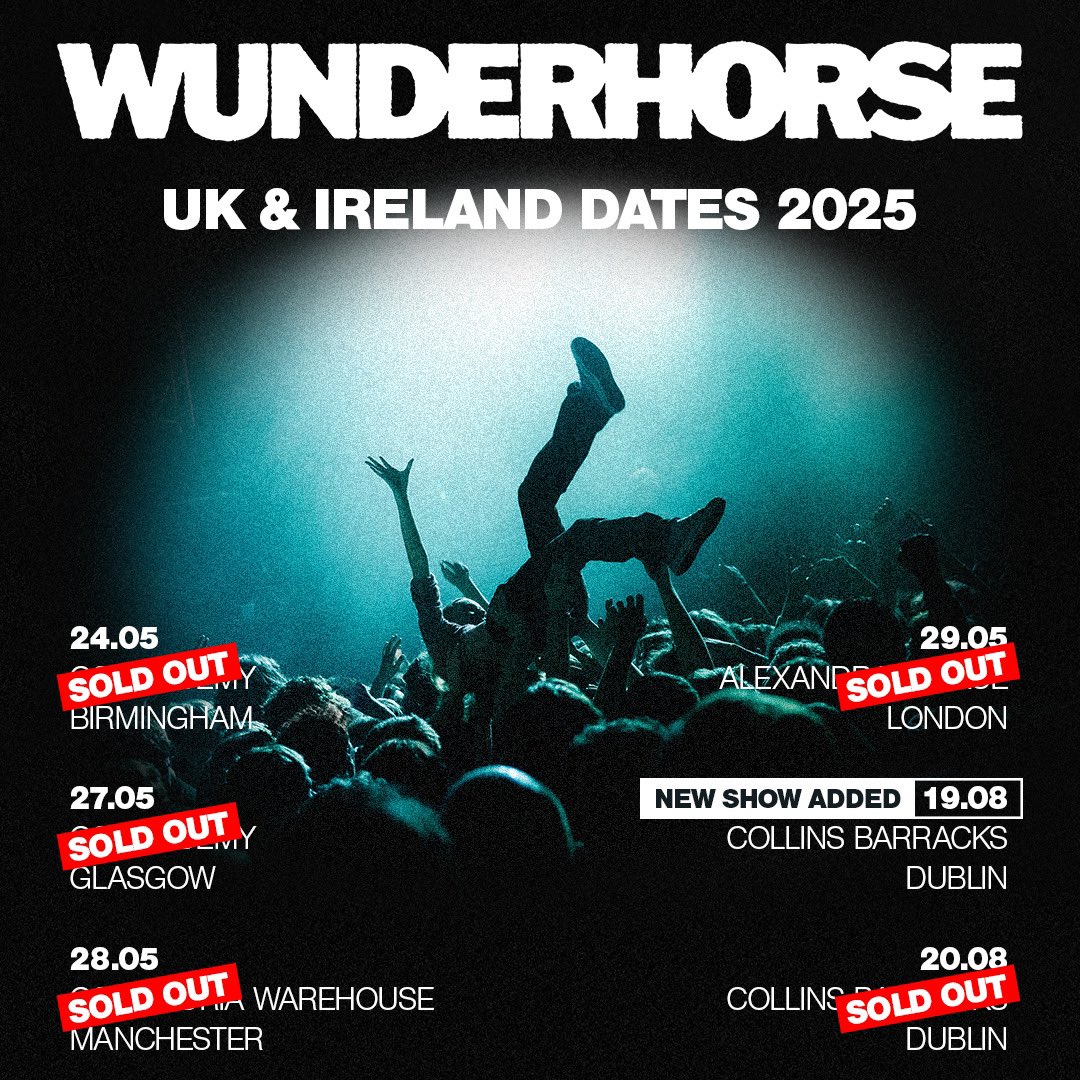
What was most striking about the Alexandra Palace show was the makeup of the audience. While many contemporary guitar acts lean on a nostalgic, older demographic, Wunderhorse have cultivated a strikingly young fanbase. These are kids no longer interested in the manicured polish of commercial pop, opting instead for the snarling guitars and stunning storytelling of a band that feels entirely their own. It is a rare, organic phenomenon; a generation of listeners who have found a spokesperson in Slater—not because he seeks the spotlight, but because he seems to treat it with a healthy, punk-indebted suspicion. As thousands of young voices screamed back lyrics to 'Arizona', 'Midas', 'Purple' and 'Teal', it became clear that the change in room size had not compromised the band's intimacy. If anything, the vastness of the Palace amplified the communal sense of catharsis.
The energy in the room was a far cry from the stationary, phone-screen-filled crowds often seen at major arena shows. Instead, the floor was a chaotic, moving mass, reminiscent of the indie-rock heydays of the early 2000s, but fueled by a modern, sober intensity. This young audience has become enamoured with the band's "no-frills" ethos—the fact that they walk out in their own clothes, plug in, and let the songs do the heavy lifting. The scope and ambition of Jacob Slater and co. cannot be questioned; they staked their claim to headline arenas on their own terms, proving that they are the band that everyone else in the industry is now chasing.

By the time the final feedback of 'July' faded out into the London night, it felt as though a torch had been passed. Wunderhorse had proved that you don't need a viral gimmick or a polished pop sheen to sell out 10,000-capacity rooms. You just need a story that resonates and the courage to play it loud enough to shake the walls. For the thousands of kids streaming out of the venue, it wasn't just a concert; it was proof that guitar music still belongs to the youth.
The arrival of 'The Rope' on June 2nd, 2025, served as a thunderous exclamation point on the band's most successful year to date. Released as a standalone single, the track bypassed traditional industry slow-burns and shot straight to Number 1 on the UK Official Singles Sales chart, as well as topping the Physical Singles and Vinyl release charts. It was a moment that proved the sheer power of the Wunderhorse community; while other artists leaned on streaming algorithms, Slater’s audience showed a physical devotion to the music, turning a singular release into a chart-topping event. Musically, the song felt like a natural evolution of the 'warts-and-all' grit found on 'Midas', yet it possessed a renewed anthemic clarity.
That Glastonbury set is one of the band's defining moments; they pulled one of the largest crowds the Park Stage has ever seen for a Friday afternoon slot. The set was a visceral split between the two records, where the "Glastonbury moment" arrived during a massive sing-along of 'Purple' and an electrifying debut of the standalone single 'The Rope'.
By the time they reached Glastonbury later that month, 'The Rope' already felt like a seasoned veteran of their setlist. As green flares filled the air and the crowd roared back every word, it became clear that the song wasn't just a bridge between albums; it was a definitive anthem for a fanbase that had found its voice.
However, it was the transition into 'Teal' that truly pushed the afternoon into the realm of the legendary. As the opening chords rang out across the hillside, they elicited a resounding roar from the crowd, met only by a cheeky, knowing grin from Slater. Live, the track becomes a different beast entirely, a visceral, raw explosion that feels far more dangerous than its studio counterpart. On that stage, it served as a masterclass in tension and release, with Slater clambering onto the drum riser, switching effortlessly between a hushed, intimate whisper and electric, guttural howls. The sight of thousands of fans proclaiming every lyric in unison was something described by onlookers as "biblical," cementing 'Teal' not just as a highlight of the set, but as one of the most significant songs of the decade. It was a performance that proved Wunderhorse are no longer just a rising act; they are a band destined for the Pyramid Stage.
Later that summer, Wunderhorse took to the high-tech Chevron Stage at Reading & Leeds 2025 and went off like a rocket. Just a year prior, the band had drawn the largest crowd in the history of the BBC Introducing tent, making a move to a massive, open-air arena a necessity. Stepping onto a stage typically reserved for the heavy-hitters of hip-hop and dance, the band proved that their "snarling guitars" were more than capable of commanding a 40,000-capacity space. Opening with the relentless drive of 'Midas' and closing with the feedback-drenched roar of 'Rain', the set was a masterclass in festival dynamics.
The performance served as a vital moment of stability after what had been a turbulent summer of broken gear and onstage chaos. Thankfully, the band let the music do the talking, delivering a ten-song set that balanced the punk-tinged Americana of 'Leader of the Pack' with the devastating emotional weight of 'Arizona'. For many, the highlight was the massive sing-along during 'Purple', which saw thousands of fans, many of whom had been following the band since those early pub gigs, unified in a single, guttural roar.
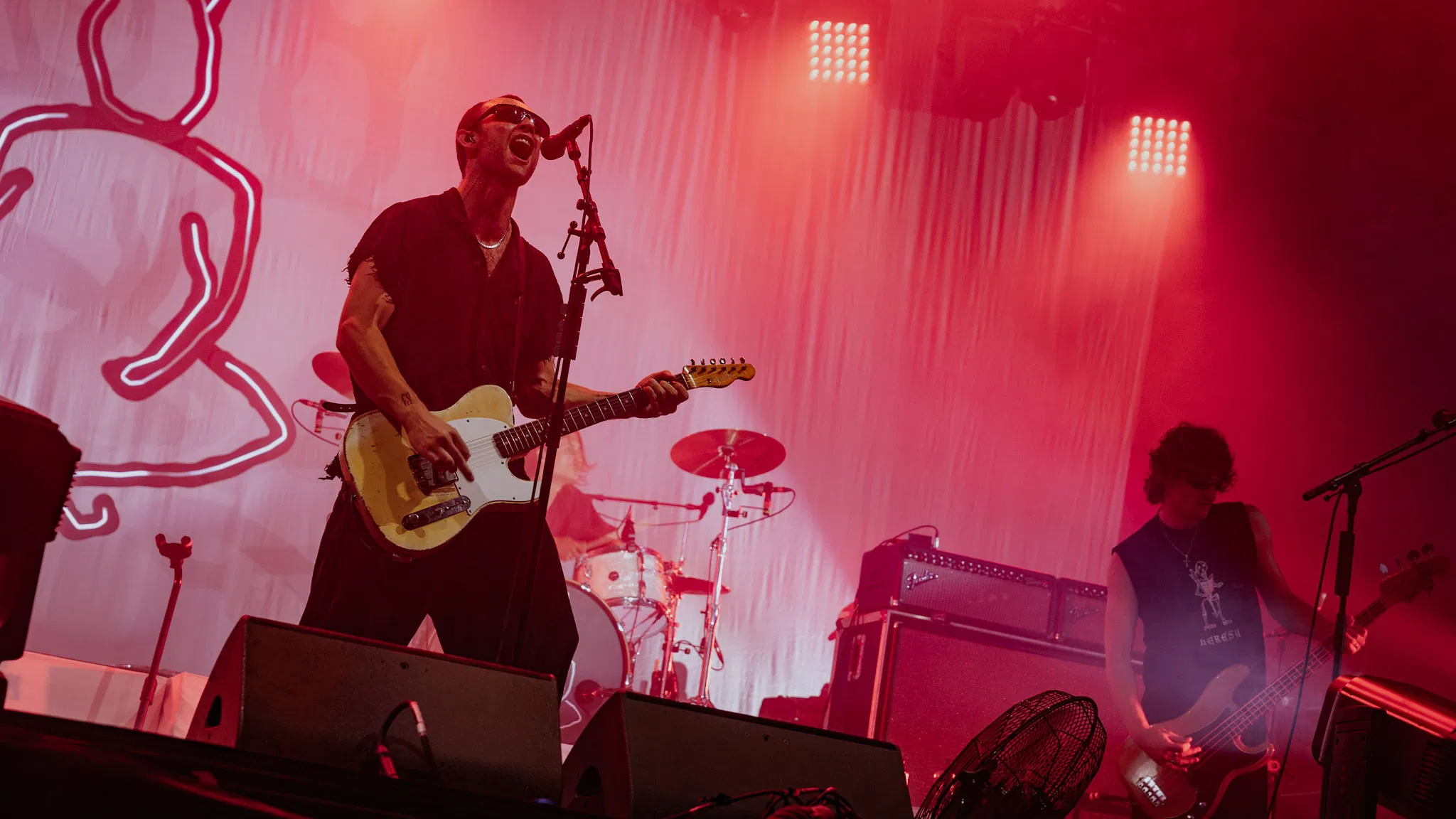
By the time they reached the final notes of the set, Wunderhorse hadn't just regained control of their summer; they had proved exactly why they are the brightest sparks in British music, enrapturing an audience of all ages and staking their claim as a future festival headliner.
Where Next?
Wunderhorse have already cemented themselves as one of the most important bands in Britain, but after the relentless momentum of the last two years, they find themselves at a fascinating crossroads. The questions now are: where do they go next, and how do they handle the weight of being the next great British guitar band?
The transition into their third album cycle feels imminent, yet unpredictable. Will the next chapter push further into the raw, heavy, and visceral grungy territory established by 'Midas', or will they return to the delicate, melodic introspection of 'Cub'? There is a permanent tension in their sound, a tug-of-war between the polished, heart-swelling anthems like 'Purple' and the unhinged, face-pressed-against-the-amp grit of 'July'.
We have already seen glimpses of this future with the release of 'The Rope'. It suggests a band that has learned to marry the two halves of their identity: the soaring storytelling that captures the masses and the jagged, uncompromising edge that keeps them dangerous. Whether their songwriting widens in scope to fill stadiums or stays rooted in the stark, sometimes uncomfortable honesty of Jacob Slater’s lyricism, one thing is certain: they are operating entirely on their own terms, allergic to the industry's demand for perfection.
As they move beyond the 10,000-capacity landmarks like Alexandra Palace, the challenge will be maintaining that communal secret feel while the rest of the world watches. Wunderhorse stand poised to become not just a band of the moment, but a defining voice for a generation seeking something real. They aren't just playing the game; they are reinventing the stakes. In an era of fleeting viral trends, they are proving they are built for the ages.